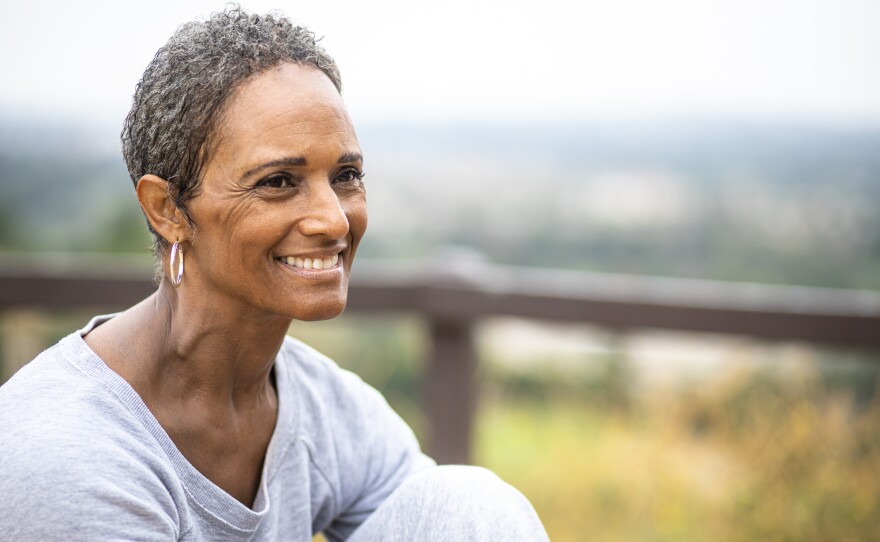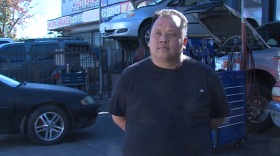Two weeks ago, university researchers told the San Diego City Council that police officers are not equipped to deal with the underlying issues of homelessness and instead cause more harm.
Their recommendation: Decriminalize quality-of-life offenses, such as blocking a sidewalk or sleeping where it’s not allowed, and put homeless outreach in the hands of trained professionals.
Less than 48 hours later, top city officials doubled down and announced plans to criminalize people who live in public.
“The answer from our homeless population can no longer be ‘no’,” Mayor Todd Gloria said during a press conference. “They cannot say ‘no’ to leaving the sidewalk, or ‘no’ that they prefer being on the street, or ‘no’ to services and help. When we ask you to come off the street and we have a place for you to go, ‘no’ is not an acceptable answer.”
Backed by Gloria, Councilmember Stephen Whitburn announced he will bring an ordinance up for a vote next month that will ban tent encampments on public property. He pointed at folks in mental distress who attack residents and customers, a drunk driver who killed three people living on a downtown sidewalk, and outbreaks of shigella in 2021 and hepatitis A that left 20 dead in 2017.
“These encampments are unsafe, they’re also a danger to neighborhoods,” Whitburn said. “The No. 1 responsibility of city government is to protect the public health and safety.”
Officials are putting together plans and evaluating locations for a city-sanctioned campsite that is away from homes and businesses, Whitburn said, where people without housing would have security and restrooms, as well as connections to services and housing. Inspiration Point in Balboa Park is one of the sites being looked at, he added, but no decisions have been made yet.
In addition, Gloria said he has directed police to resume a ban against living in a car, known as vehicle habitation. Records show police haven’t cited or arrested anyone for that offense since December 2021, but officers will start again Saturday.
“We’re trying to set an expectation about what is acceptable in this city,” Gloria said. “What is happening in too many corners of the city is absolutely unacceptable and it has to change.”
Since the start of the pandemic, San Diego police have increasingly used a law known as encroachment to break up tent encampments and punish those who refuse to go to a shelter. That law was intended to prohibit trash cans from blocking a sidewalk but is now facing a constitutional challenge in criminal court. Whitburn said it’s time the city tackled the issue of tent encampments head on with a new, straightforward law.
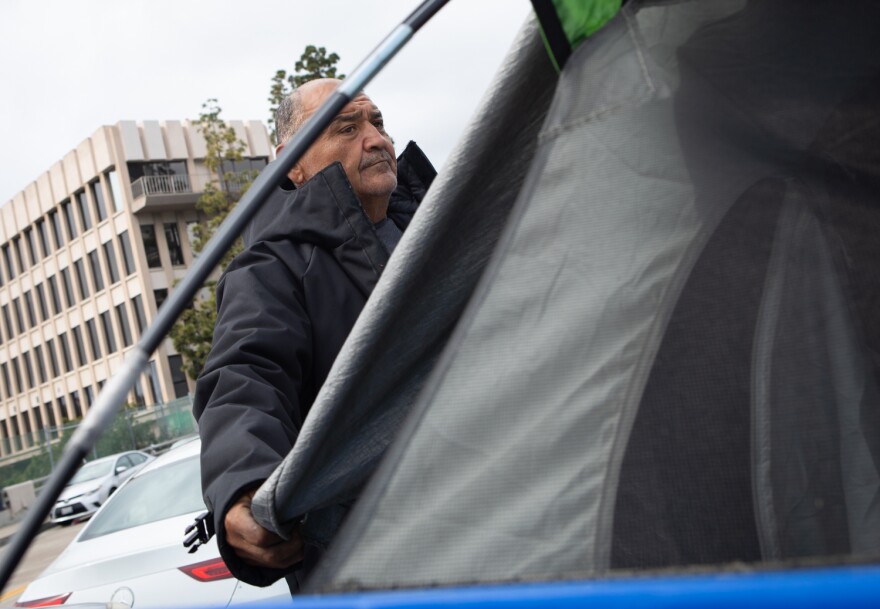
This comes at a time when nearly twice as many San Diegans are becoming homeless as those who manage to leave the streets, and when the city is failing to meet housing demand for people of all incomes. A study found the lack of availability has driven up rents by 15%.
The city’s latest plan would make it illegal for San Diegans without housing to live outside of shelters or the proposed campsite. The problem, attorneys say, is that it’s unconstitutional.
Eric Tars, legal director at the National Homelessness Law Center, said the city’s proposed camping ordinance flies in the face of established rights and will likely be challenged in court.
“San Diego will spend more of its taxpayers’ money defending a, frankly, morally indefensible law that, instead of actually solving the problem, is just going to make it worse,” Tars said.
‘Black lives experiencing homelessness matter’
On March 14, Megan Welsh Carroll and Shawn Flanigan, both with San Diego State University, presented findings from a study they published last summer and offered recommendations to the City Council.
They told councilmembers the study began early in the pandemic with a question — how are people staying healthy and meeting basic needs while living on the streets during the COVID-19 pandemic?
They also really wanted to hear from unhoused Black people, since their voices are often underrepresented despite high rates of homelessness. Black people represent less than 5% of the city’s general population, but estimates show they make up more than a quarter of unhoused San Diegans overall.
Between May and September 2020, they sent surveys asking folks if they had access to masks, handwashing, bathrooms and other services — only two or three questions were about police, Welsh Carroll said.
Roughly 250 people — nearly half are Black — responded to the survey. The answers forced Welsh Carroll and Flanigan to rethink their focus, shifting from health to policing and race.
Of the people surveyed, 80% reported experiencing police contact within the past three months, and only 13% of those folks were offered services. None of the Black participants said they were offered help by police.
This directly contradicts a court order that San Diego police offer shelter prior to enforcing encroachment. Before receiving a citation under this law, someone would have to refuse shelter at least twice — and refuse at least four times before going to jail.
“More often, the experiences folks shared with us of encounters with the police involved being told to move, having the vehicle in which they live towed, or being ticketed or even arrested. As one participant put it, ‘If you consider tickets a resource, then the police have done that.’”Megan Welsh Carroll, San Diego State University
“More often, the experiences folks shared with us of encounters with the police involved being told to move, having the vehicle in which they live towed, or being ticketed or even arrested,” Welsh Carroll said in her presentation to the City Council. “As one participant put it, ‘If you consider tickets a resource, then the police have done that.’”
Unhoused San Diegans reported being met with disrespect, racism, sexism and homophobia by police officers, who failed to offer basic services during these encounters.
“One person told us ‘I am a lifeless, Black, unimportant soul to them,’” Welsh Carroll told councilmembers.
She and Flanigan offered concrete examples on how officials can do better. Stop criminalizing people for blocking a sidewalk or sleeping where it’s not allowed — it does little to prevent crime. And stop making police officers the first and only responders to homelessness — they don’t have the training to solve these problems.
“We must ask ourselves, what are the ethical implications of asking our most vulnerable residents to seek services from individuals and agencies that they often perceive as perpetrators of harm?” Welsh Carroll said. “Particularly if it makes it less likely for people to accept any services at all.”
Rather than using police to break up tent encampments, try providing services. The city of San Jose has shown that managing these areas — just by providing regular trash pickup or bathroom services — instead of criminalizing them, can deter crime, Flanigan said.
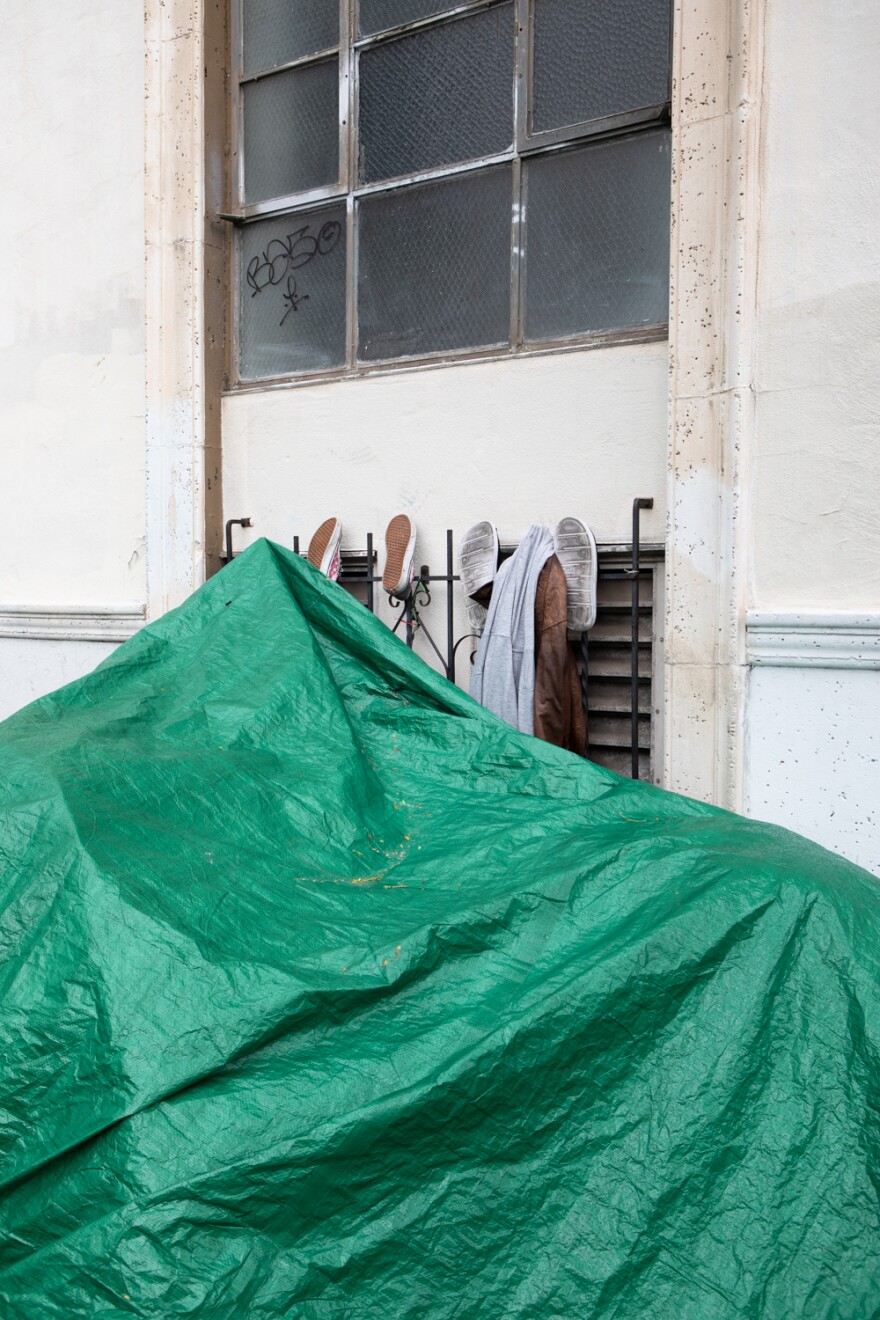
“Folks don’t like to engage in criminal activity when city officials are coming by all the time,” she added.
Councilmember Monica Montgomery Steppe said she was overwhelmed by the presentation and feels an obligation to lead on this issue, but it takes buy-in for systemic change. She said she’s fighting against systems that are built to do exactly what they’re doing.
“We could pass something and we could turn it over, and guess what? It will not be implemented,” she said. “I don’t expect this to change to happen overnight, but as long as I’m in a position of power, I’m going to push it.”
Whitburn thanked the researchers for their presentation and quoted a sentence from the slideshow that stressed the importance of providing basic human needs, such as water, toilets, trash disposal and safe place to wait for housing.
“We absolutely must prioritize that. In fact, I’ll be bringing forward a safe sleeping initiative that is designed to do just that,” he said.
On the same slide he quoted from, however, Whitburn ignored a sentence that said the city shouldn’t punish people for sleeping in public — a key component of what he was planning to announce less than 48 hours later.
A reasonable rule
The presentation was only an informational item, meaning councilmembers didn’t take any action. These items are regularly placed on agendas to provide updates, as well as guide or influence policy decisions.
But it clearly did not make a dent, Welsh Carroll told inewsource in a recent interview. If the city follows through with this proposal, she said it will lead to predictable harm.
“That’s what makes it pretty disappointing,” she added, “that we seem to be doubling down on tactics that we know don’t work and are harmful.”
Whitburn told inewsource he thinks it’s perfectly reasonable to have a rule that says people cannot camp on a public sidewalk if there is a better place to go.
“It is our responsibility to provide those better places for people,” Whitburn said in an interview, “and then also insist that if we have a place for people to go that is better than the sidewalk, that they take advantage of that.”
He said officials have heard complaints about the city breaking up encampments with a law that was intended for trash cans blocking a sidewalk. He’s not comfortable with that.
“I’m sorry, unsheltered people are not trash cans left in the middle of the sidewalk, they’re human beings,” Whitburn said. “Let’s have a rule that specifically takes on the situation at hand. Let’s tell people exactly what we expect.”
The current crisis is pushing people away from downtown, he added.
“I live downtown. I work downtown. I love downtown. It has so much potential and it is such a wonderful place,” Whitburn said. “And to see people moving out breaks my heart. To see people decline to come to downtown, to patronize our businesses here, breaks my heart.”
Ideally, he said, this proposal would take unhoused folks out of unsafe and unsanitary conditions, put them in a place away from homes and businesses, and give them the help they need to get back on their feet. But anyone who refuses to go will face consequences.
“I believe strongly in civil liberties,” Whitburn said. “I also believe that we need to make sure as a society that we are creating appropriate spaces for the people who are unsheltered.”
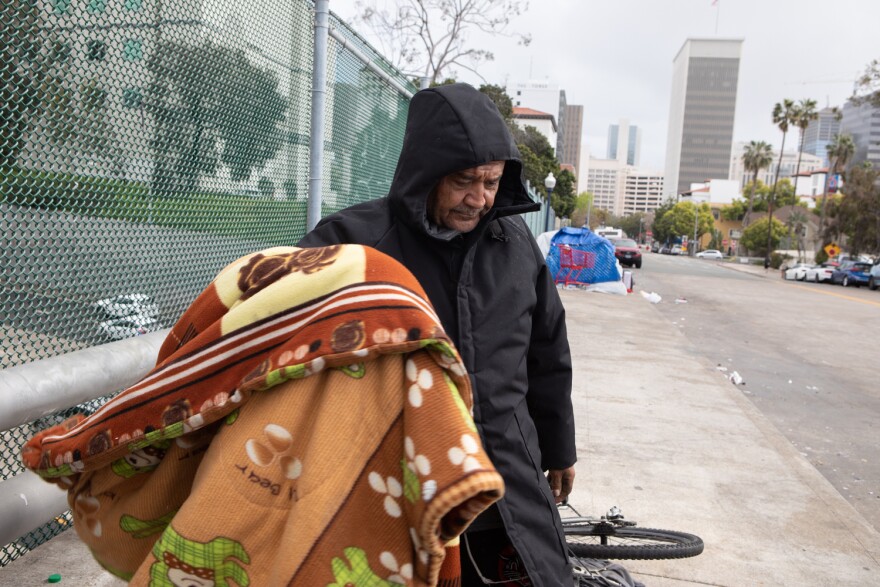
When asked how he could move forward with this proposal after SDSU researchers’ presentation, Whitburn said he understands where they were coming from. He understands the concern that this could contribute to the over-policing of Black people, since they represent a disproportionate number of unhoused San Diegans.
“We need to address disparities in policing, there is no room for inequitable policing,” he said. “But I don’t think that means we shouldn’t pass laws.”
In a statement, a member of Gloria’s communication team insisted that the city is not criminalizing homelessness and that the mayor does not believe being unhoused makes someone a criminal. But it also doesn’t mean unhoused people have a “get out of jail free card either," said spokesperson David Rolland.
The city has a duty to enforce laws that protect unhoused folks from disease and predators, as well as school children, people with mobility issues and others who are forced into the street to pass encampments.
“Criticism from those who are not responsible for protecting public health and safety, and not tasked with meaningfully addressing homelessness won’t stop this mayor from doing his job,” Rolland said in an email.
Council President Sean Elo-Rivera said he plans to review Whitburn’s proposal the same way he would all others — through the lens of racial justice and inequity. And that’s what stood out to him most about SDSU’s presentation, he told inewsource, that racial justice and inequity bubbled to the surface in what was supposed to be a study on public health.
“I don’t know how you can look at those disparities and not recognize that there’s structural and systemic issues at play,” he said, referring to the disproportionate number of unhoused Black San Diegans and how all reported barriers to services.
Elo-Rivera said he placed the item on the agenda because he felt it was an important conversation. He said his colleagues are free to take information as they see fit.
That being said, he doesn’t believe someone is a criminal simply because they are homeless.
“It is immoral to see someone who’s experiencing homelessness as a criminal simply for being homeless,” Elo-Rivera said.
But when asked if he agrees with researchers that encroachment, illegal lodging or camping should not be crimes, he hesitated.
“As a general statement, I am inclined to be supportive of that position in many ways,” Elo-Rivera said. But there should be limits to protect public health and safety.
“I don’t think that putting expectations around health and safety, and putting time, place and manner restrictions in place is the same as saying it’s illegal to be homeless,” he added. “Is it an easy balance to find? No.”
What does the law say?
Cities cannot criminalize people for carrying out life-sustaining activities in public view, such as sleeping or sheltering, when there is no other practically accessible option. That comes from a 2018 federal court ruling known as Martin v. Boise.
“Practically accessible” is subjective and can depend on the person, said Tars, the legal director with the National Homelessness Law Center. He was the attorney of record in the lawsuit against Boise, Idaho.
The decision ultimately says just because a shelter bed is available, doesn’t mean it’s practically accessible, Tars said. For example, an all-men’s shelter would not be practically accessible for a woman. A congregate, dormitory-style setting might not be practically available to a veteran with post-traumatic stress.
“If someone is saying ‘no’ to the help you’re offering, especially under the threat of arrest, then you need to really look at what you’re offering rather than at that person’s refusal,” he added.
Whitburn’s proposed ordinance says it would be illegal to camp on any public property if shelter beds are available. But it goes on to say regardless of shelter availability, it would be illegal to camp within two blocks of schools or shelters, in parks or transit hubs, as well as “in any open space, waterway, or natural area abutting a waterway.”
Tars said “any open space” could be taken to mean literally any open space in public — a clear violation of established constitutional rights. But it doesn’t end there.
It appears city officials are betting this proposed campsite would align with the court’s ruling that people need a practically accessible shelter to go to, but that’s not a safe bet to make, he added.
The city of Chico tried the same thing, offering a campsite next to the airport. A judge shot that down and said it doesn’t qualify as shelter.
After the Martin v. Boise ruling, Tars said he would have hoped government officials would start addressing the underlying issues of homelessness.
“Instead, they keep trying to do the same thing,” he said, “but word it slightly differently so that they think they can find the constitutional way to do what the courts have clearly said is unconstitutional.”
-
Leaving an abusive relationship isn’t easy, and for many people, embarking on a legal process to seek a divorce or child support is intimidating, but a nonprofit in Vista is helping men and women every step of the way.
-
You've got questions, we've got answers about menopause.






